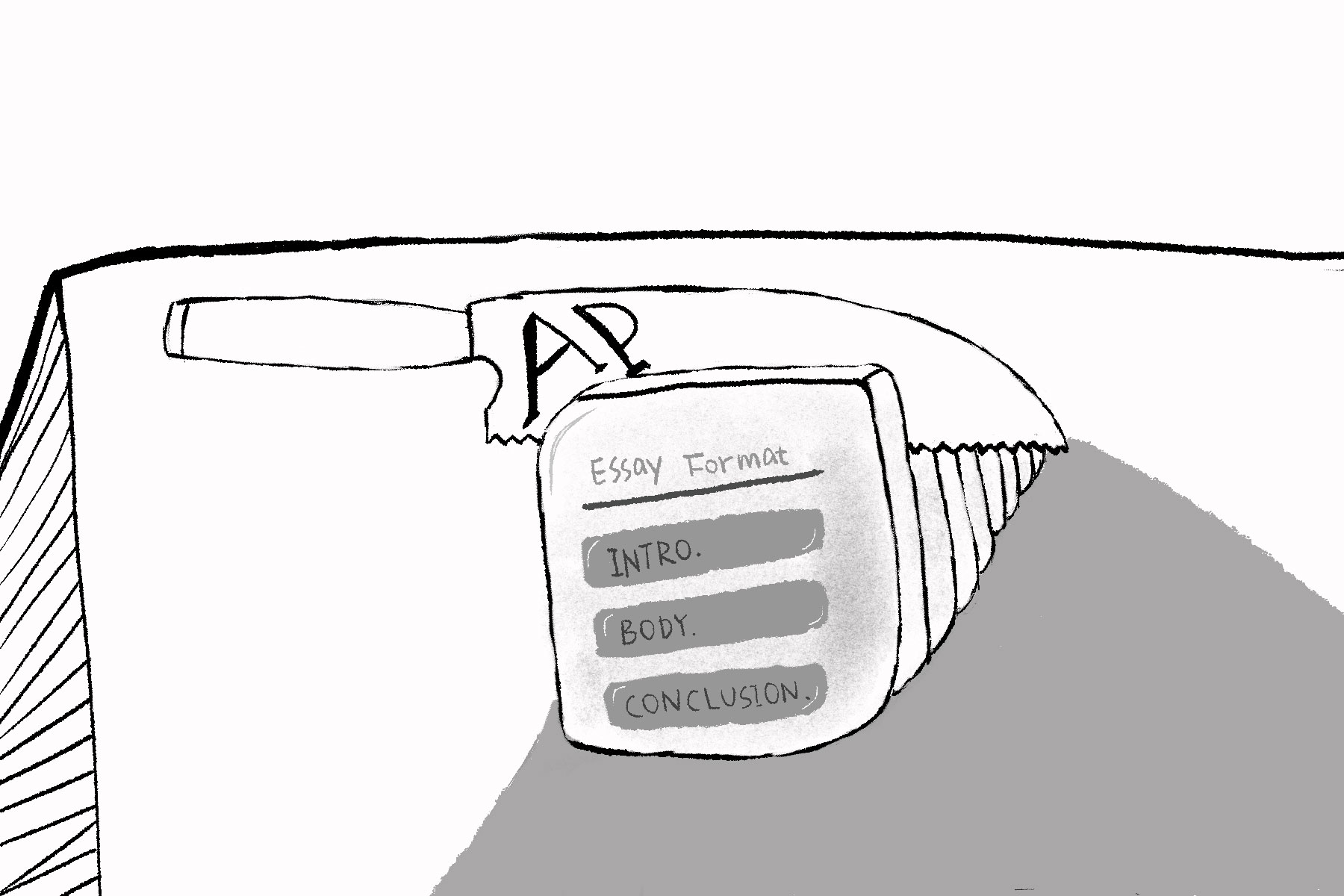“The easiest way to make a test ‘reliable’ is to make it crude. Instead of having students write a genuine essay, assign a 20-minute ‘free response.’ Instead of posing a genuine question, ask a stupid question on a trivial topic.”
–David Owen, None of the Above: The Truth behind the SATs
Every high schooler in America knows what an Advanced Placement, or AP, class is: a course that potentially awards college credit based on performance on the standardized final exam. On a scale from one to five, any score above a two can fulfill course requirements at certain higher education institutions. The organization in charge of these classes, College Board, promises that APs possess equivalent educational value to classes offered at universities and colleges. However, this claim is only sometimes true. While the STEM-oriented AP classes are often on par with their college counterparts, the English ones leave much to be desired.
The College Board offers two English courses. English Language and Composition is advertised as “an introductory college-level composition course.” English Literature and Composition as “an introductory college-level analysis course.” Both of these claims are highly misleading because while the English exams are certainly introductory, they are not college-level. AP English courses are less rigorous than college courses and serve only as a perfunctory overview of English language and literature. The “essential knowledge” the AP Language coursebook emphasizes includes gems such as: “The purpose of a text is what the writer hopes to accomplish with it,” and “Writers express ideas in sentences.” A stellar score on the AP exam does not necessarily predict future success in higher education, nor does a low score indicate the opposite.
The purposes of AP and college courses are fundamentally different. AP classes prepare students for a standardized exam. College classes focus more on the process of learning than on the product of learning. Some college professors do not even include a final in their syllabus because the object of the class is not a single score, but on the cumulation of months of work. At higher education institutions, many humanities and non-STEM students have no reason to stay during finals week because their grades depend entirely on essays, participation, and attendance, not a sit-down final. This is a key difference between how College Board and college professors’ success of their students .
In high school, the AP English exam’s goal is to measure a student’s analytical and interpretive abilities, which cannot be standardized effectively. Language is subjective. The College Board’s endeavor to make it objective for the sake of efficient grading is contrary to their mission of “expand[ing] access to higher education.” The College Board actively dissuades students from writing and analyzing freely on their exams despite the fact that college is the place where free thought is most important. AP graders guerdon conformity and train students to write boring, milquetoast essays, which only makes the transition to college more difficult. To better understand how the College Board objectifies artistry, it is imperative to look at the precise formatting and rubrics for the final exams.
In both of the English AP exams, 45% of the score is based on multiple-choice questions, which already suggests a faulty test system. If an analytical inquiry can be boiled down to a multiple-choice question with five potential answers, then it is not an inquiry with remarkable complexity or nuance. A truly engaging question about a literary excerpt has a variety of potential answers, all equally insightful and valid. Only jejune questions have a single correct response, and as such only basic and jejune questions make it onto the AP exam. The multiple-choice segments of both exams rely on the simplification of multifaceted concepts or the omission of multifaceted topics in favor of basic ones. In no way does this benefit the test-takers or equip them with advanced analytical tools. Rather, it teaches students that correctness is one-dimensional. In college, that belief only sets students back.
The remaining 55% of the AP exam score is determined by Free Response Questions (FRQs), which are based on outside sources and the student’s ability to write a coherent essay responding to a given prompt. While marginally better at evaluating a student’s knowledge and creativity, these FRQs are horribly reductive of the art of writing. Most students are trained to write the ideal FRQ by learning the template AP graders reward, so they practice writing essays all year in the very specific format and style that will earn them the highest score. Drilling this format can improve students’ basic essay skills such as brevity and clarity, but does not encourage creativity. Writing an FRQ becomes a practice in filling in the blanks because students simply put their thesis and supporting arguments into a cookie-cutter essay structure.
The FRQ score is based on four things: thesis, evidence, commentary, and sophistication. The quality of an essay cannot be measured by such simplistic attributes. There is focus, originality, coherence and much more to consider. It is immensely difficult to determine the profundity of an essay by considering those four aspects alone, but for the sake of standardization, the College Board does just that.
Leaving high school with a multitude of APs under their belts, students may initially struggle with adjusting to college literature classes. Most jarring could be the sheer quantity of writing required to scrape by, because essays in college are typically longer and more frequent than essays in high school. The content of the essays changes, too. An undergraduate literature student will be expected to produce unique, thought-provoking pieces of writing. At times, professors give no prompt for the assignments and allow their students to write without hindrance. The independence stressed in colleges affords students the space to grow intellectually, without excessive input from professors. AP students, contrarily, receive more guidance when writing, as they are given straightforward prompts that limit the number of directions to take the essay in. The rote memorization of literary and poetic terms in AP classes may come in handy at higher levels, but does nothing of use if the students are not also prepared to think without unnecessary instruction.
AP classes still have some merit. Even students who fail the actual exams have higher rates of enrollment in four-year colleges than their peers who did not take any AP courses. The presence of AP classes in school curricula can indicate a higher quality of education. While the content is certainly not of the same caliber as college courses, it is sometimes better than non-regulated courses at underfunded schools. AP English courses specifically can actually be helpful to many students. They may not be college-caliber and they may not assist prospective English majors in their studies overall. But for students less language-inclined, the AP essay training can help teach basic thought organization. The essays AP rewards may not be groundbreaking or special, but they are certainly organized and concise, which counts for something.
At the end of the day, AP English classes fall short of what they promise, regardless of the benefits. The restrictive curricula and over-simplified exams are inimical to a student’s pursuit of true profound learning. The College Board’s assertion of their own rigor and quality only serves to highlight the real banality that lies in their coursebooks.
















